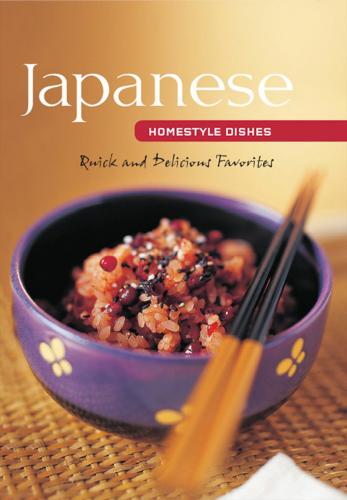Published by Periplus Editions
Copyright © 2003 Periplus Editions (HK) Ltd. All rights reserved. No part of this publication may be reproduced, stored in a retrieval system or transmitted in any form or by any means, electronic, mechanical, photocopying, recording or otherwise without the prior written permission of the publisher.
ISBN: 978-1-4629-0575-1 (ebook)
Recipes: Susie Donald
Photography: Masano Kawana and Adrian Lander
Food Styling: Susie Donald and Masano Kawana
Design: Periplus Design Team
Distributed by:
USA, Tuttle Publishing, 364 Innovation Drive,
North Clarendon, VT 05759-9436, USA.
Tel: 1 (802) 773-8930; Fax: 1 (802) 773-6993
Japan, Tuttle Publishing, Yaekari Building,
3rd Floor 5-4-12 Osaki, Shinagawa-ku,
Tokyo 141 0032
Tel. (81) 3 5437-0171; Fax. (81) 3 5437-0755
Asia Pacific, Berkeley Books Pte. Ltd.,
61 Tai Seng Avenue, #02-12 Singapore 534167
Tel: (65) 6280-1330; Fax: (65) 6280-6290
Printed in Malaysia
12 11 10 10 9 8 7 6
Contents
| Introduction | 3 |
| Japanese Cooking Utensils | 4 |
| Basic Japanese Ingredients | 5 |
| Buying Fish for Sashimi and Sushi | 10 |
| How to Prepare Basic Sushi Rice | 12 |
| Basic Japanese Dips and Sauces | 14 |
| Healthy Soups and Appetizers | 16 |
| Sashimi and Sushi | 40 |
| Tofu and Vegetable Dishes | 78 |
| Noodles and Rice Dishes | 86 |
| Cooked Seafood Dishes | 94 |
| Poultry and Meat Dishes | 106 |
| Desserts | 124 |
| Complete Recipe Listing | 128 |
MAIL ORDER SOURCES
Finding the ingredients for Asian home cooking has become very simple. Most supermarkets carry staples such as soy sauce, fresh ginger and lemongrass. Almost every large metropolitan area has Asian markets serving the local population—just check your local business directory. With the Internet, exotic Asian ingredients and cooking utensils can be easily found online. The following list is a good starting point of online merchants offering a wide variety of goods and services.
http://www.asiafoods.com http://www.geocities.com/MadisonAvenue/8074/VarorE.html http://dmoz.org/Shopping/Food/Ethnic_and_Regional/Asian/ http://templeofthai.com/ http://www.orientalpantry.com/ http://www.zestyfoods.com/ http://www.thaigrocer.com/Merchant/index.htm http://asianwok.com/ http://pilipinomart.com/ http://www.indiangrocerynet.com/
The traditional Japanese meal is a work of art from the kitchen— balanced in color, texture and design. Applauded for its elegant simplicity and appreciated for its reliance on the freshest ingredients, the Japanese way of cooking fits easily into today’s culinary scene, appealing to those who appreciate healthy eating, lighter portions and artistic presentations. At its best, a Japanese meal, with each course served on specially selected dinnerware, resembles a still life painting rendered in food and ceramics.
A Japanese meal can be put together quickly and easily. Most recipes call for only a handful of ingredients: rice, soy sauce, wasabi powder, sake, sesame seeds, dried shiitake mushrooms, ginger, wheat or buckwheat noodles, dashi stock, and tofu are some of the cornerstones of a Japanese meal. The trick is to keep a larder stocked with the Japanese essentials and to plan ahead—purchasing the fish, meat or vegetables the day they should be cooked.
The best known of all Japanese foods, sushi—tasty morsels of vinegared rice with slices of raw fish and a touch of wasabi underneath—has become so popular in the West that many restaurants now serve it as an appetizer.
In large metropolitan areas, fresh sushi packs are even sold in well-stocked supermarkets. This volume includes easy-to-follow instructions for preparing various types of sushi, from the well known “finger” or Nigiri Sushi and California Rolls, to the hand-rolled “cone” or Temaki Sushi. Also presented are other Japanese all-time favorites such as Miso Soup, Traditional Seafood Sashimi Platter, Tempura and Grilled Skewered Chicken or yakitori.
All the recipes are light, healthy and delicious, and require no special skill or ingredients. This book promises a delightful venture into the world of Japanese cuisine.
Japanese Cooking Utensils
|
|
Bamboo rolling mat (makisu): Widely available from Asian supermarkets and very inexpensive, this simple bamboo mat is a must-have utensil for rolling rice inside wrappers of seaweed and for rolling Japanese omelets. Fish-bone tweezers (hone nuki): A pair of flat-ended tweezers is always present in a Japanese kitchen for deboning fish. |
|
|
Hotpot: A circular clay pot with a cover,
|
